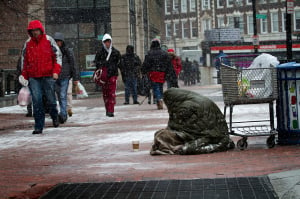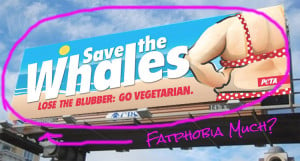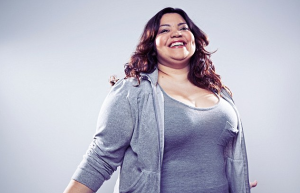
Source: Here and Now
I’ve moved to the other side of the street to avoid it. I’ve lowered my eyes so that I didn’t have to acknowledge it. I’ve brushed it off with excuses to make me feel a little less guilty.
When I’m being honest, panhandling makes me uncomfortable.
As a woman, I’m generally uncomfortable around anyone demanding my attention on the street. But besides those who are catcalling, there’s a certain population I’ve ignored because I’ve often felt helpless or unsure of what to do — until now.
Panhandling is when people ask for money in public spaces. Most panhandlers (although not all) are experiencing homelessness. In many cities, panhandling is considered free speech and is protected by the first amendment. Many of us encounter those who are panhandling on a daily basis.
We know they deserve compassion, but we may not know how best to give it. How should we respond to people panhandling or experiencing homelessness?
Here is an easy step-by-step guide to responding responsibly and compassionately to those who are panhandling.
1. Say ‘Hello’
Most people don’t even recognize that the person panhandling is a human. For many, we’ve been so conditioned to disregard and not care about homelessness that the brain chemically responds to that person on the street as if they weren’t a person at all.
These are people trying to survive. And at best, we treat them like a nuisance. You can help those who are panhandling by just recognizing that person’s humanity.
Consider that other people passing by on the street are mostly ignoring these people panhandling. Some people are even verbally and physically attacking them for panhandling.
The violence towards those experiencing homelessness has continued to increase.
Can you imagine what it would be like to be spit on and have insults hurled at you all day, every day? After being questioned and humiliated all day, simple eye contact and a smile from a stranger can go a long way.
It may feel uncomfortable acknowledging them — especially if you don’t have money to give — but that’s a personal issue.
After making a concerted effort to unpack this feeling, I realized that the reason I feel uncomfortable when I see a person panhandling or a person experiencing homelessness is because it reminds me of my privilege.
I don’t have to sleep outside or ask for money to meet my most basic needs. And it’s hard to accept that other people do.
But my privileged comfort is not more important than their humanity.
I can do my part in supporting those who are panhandling by simply reminding myself that they are human. I may still feel sad, upset, and uncomfortable, but I no longer allow those emotions to make me turn away from the reality that there is still a person in front of me.
Look them in the eye. Give them a nod. Give them a friendly smile. Wish them a good day. Do whatever you can to acknowledge your fellow human beings.
2. Give (If You Can)
People are panhandling for a reason. Regardless of what this person might have done before, their basic living needs are not being met in the present.
Some individuals who have survived from panhandling have admitted that it is a very degrading experience, and doing so is often a last resort.
While we might see stories in the media about people pretending to be homeless, asking for money, and then zooming away in their convertible, that is truly not the case for the majority of people panhandling on the street.
Don’t let a few high-profile liars keep you from giving to the millions of disenfranchised people.
Many people also hesitate to give money out of fear that it will “support their addiction.”
First of all, this fear is vastly overstated. In a recent study of people panhandling in San Francisco, 94% disclosed that they spend the money they collect while panhandling on food. Less than half admitted to spending that money on drugs or alcohol.
Secondly, while many people, homeless or not, are struggling with addictions, we shouldn’t police where our money goes if we give it away.
When we give our dollars directly to these people, we are empowering them to make a choice, and we have to trust that they will make the best choice for themselves while they live in these extreme conditions.
Unless we have experienced the same circumstances, we cannot judge or assume we know what’s best for their situation.
For example, a person who has experienced homelessness shared with me that drinking a bottle of wine was enough to make them feel warm enough to sleep through another freezing winter night outside.
It’s not ideal (ideally, they would have access to warmer clothes — or, you know, a home), but it’s what they could afford and it helped them survive. We have no right to judge that.
There are also a number of things that services for those experiencing homelessness can’t provide.
Shelters, food pantries, and local support groups alone can’t provide things like flashlight batteries or cell phone minutes, for example. Your money could very well be going toward these necessary items.
If you are able to help financially, but still don’t want to give your money to them directly, you could ask what they specifically need and see if you could help provide that.
Consider purchasing gift cards to restaurants nearby or keeping a few Ziploc bags full of things like toiletries and snacks in your car for these occasions.
Depending on where you live, you might see the same individuals every day. If you feel comfortable enough, maybe invite them to join you for a meal somewhere. It’s okay to establish a relationship, even if you can’t give your time or money every day.
Remember that it’s okay to say “no,” too. But if you are able and feel called to give someone panhandling money, then give.
Know that your money is going to be spent on the best choice for them.
3. Get Involved
So you’ve overcome the dehumanizing mindset, and you’ve given to a person for short-term relief from extreme circumstances. That’s great! But how can you address these problems more proactively going forward?
Get involved.
Volunteer
Volunteering with local organizations working to prevent and end homelessness is a great way to support your local community and those who are panhandling.
While the winter holidays are when people are feeling the most charitable, volunteers are needed year round. Ask your local organizations when they need help, and get creative using your own unique talents and skills to assist them.
Get Educated About the Causes
We know that there are many reasons why people become homeless.
Nationally, there is a shortage of affordable housing. Even those working full-time earning minimum wage cannot afford the rising cost of living in this country to support their families.
On top of our failing systems, homelessness is becoming criminalized nationally. Laws are being passed that prohibit life-sustaining activities such as sitting, eating, and sleeping in public spaces.
Even trespassing ordinances ban people with “scent that is unreasonably offensive to others.” For this specific law, not only can people be banned and punished for being “too smelly,” but also for trying to wash themselves in public bathrooms.
In the last year alone, at least 31 cities nationwide have tried to restrict or ban groups from passing out or sharing food in public.
Besides the laws that are trying to hide these people experiencing homelessness, there are no laws protecting the homeless population from hate-crimes.
Advocate
As a college student, my budget and time to volunteer on-site are both limited. However, I can do my part to help end violence against and criminalization of panhandling and homelessness by educating myself and lobbying on my own schedule.
My local Homeless Coalition directs me with letter writing, sending e-mails, and making phone calls to our local officials who can prevent these laws that criminalize homelessness from passing.
I can also respond to and prevent others from harassing and trying to stop people that are panhandling if I know my local laws and ordinances.
***
While encountering those who are panhandling may be initially uncomfortable for me, I have to remember that those people are living in conditions much worse than discomfort.
I no longer dismiss or blame these individuals for their circumstances, but instead attempt to do my part to provide support — both immediate and sustainable — for the people in my community.
Responding responsibly and compassionately to panhandling allows for a bigger movement to prevent homelessness to happen and help all of those experiencing homelessness and who panhandle.
[do_widget id=”text-101″]
Sara Whitestone is a Contributing Writer for Everyday Feminism and a third year student at the University of Cincinnati studying Biology with a minor in Women’s Studies. As a disabled feminist, Sara proudly advocates for accessibility issues and other students with disabilities at UC. She is founder and President of Sara Spins, a foundation dedicated to raising funds and awareness for students with disabilities. Sara’s an avid foodie and amateur yogi with goals of healing her chronic illness holistically. When she’s not making a complete mess of her kitchen or trying to keep up with her personal health blog, she enjoys taking naps on campus, attempting to be punny on Twitter and searching for new street art downtown.
This article was written in collaboration with Michele Dillingham, Education Director at the Greater Cincinnati Coalition for the Homeless. As a unified social action agency, they are fully committed to its ultimate goal: the eradication of homelessness with respect for the dignity and diversity of its membership, the homeless and the community. The Coalition works towards this goal by coordinating services, educating the public, and engaging in grassroots organizing and advocacy. Michelle administers the educational component of the Greater Cincinnati Coalition for the Homeless’ to educate the public about homelessness and poverty and combat harmful stereotypes and myths about homelessness.
Search our 3000+ articles!
Read our articles about:
Our online racial justice training
Used by hundreds of universities, non-profits, and businesses.
Click to learn more




















